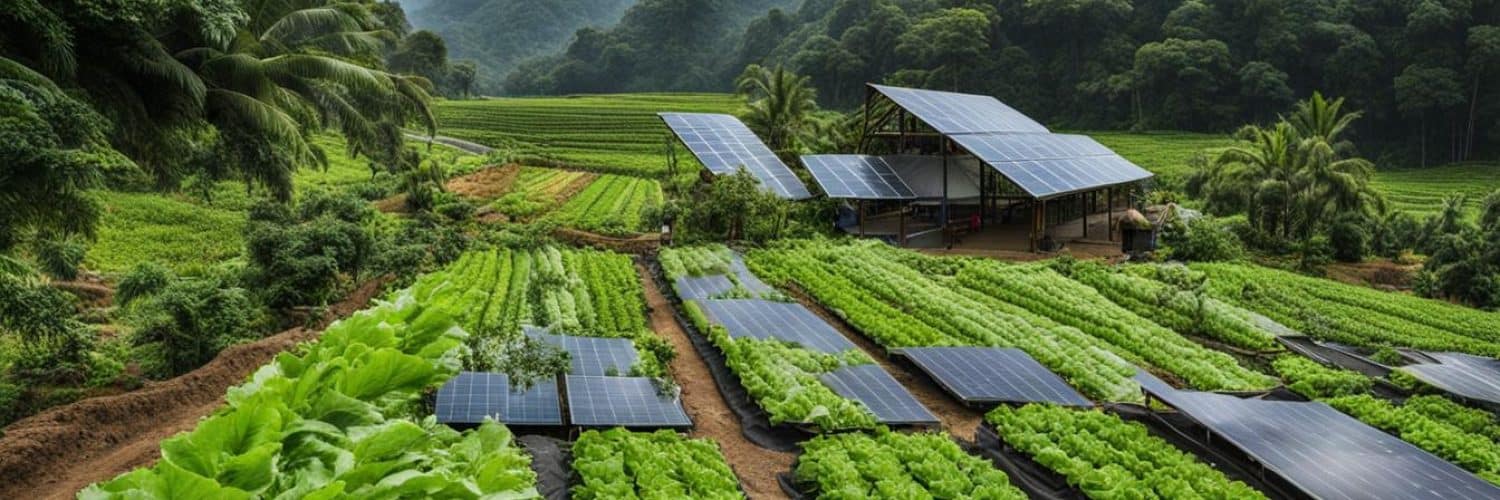Welcome to Jiabong Organic Farm, a sustainable sanctuary nestled in the heart of Samar, Philippines. Known for its commitment to organic farming and sustainable agriculture, this eco-friendly haven is dedicated to providing locally sourced produce and promoting sustainable living. Get ready to embark on a journey of discovery as we delve into the beauty of Jiabong Organic Farm and its eco-friendly farming practices.
Key Takeaways:
- Jiabong Organic Farm is a sustainable sanctuary in Samar, Philippines.
- The farm is dedicated to organic farming and sustainable agriculture.
- Visitors can explore the farm through immersive farm tours.
- Jiabong Organic Farm practices eco-friendly farming methods to support the environment.
- The farm promotes sustainable living and supports local communities.
The Importance of Organic Farming
Organic farming plays a crucial role in promoting sustainable agriculture and protecting the environment. By avoiding the use of synthetic pesticides and fertilizers, organic farmers ensure that their produce is free from harmful chemicals. This not only benefits the consumers who enjoy organic fruits and vegetables but also helps to maintain soil health and biodiversity. Organic farming also reduces greenhouse gas emissions and promotes water conservation, making it an essential practice for eco-conscious consumers.
When you choose organic produce, you are supporting a farming method that prioritizes the health of the planet and the well-being of future generations. By opting for organic foods, you can enjoy the peace of mind knowing that your diet is free from potentially harmful substances and contributes to a cleaner environment.
The Benefits of Organic Farming
Let’s take a closer look at some of the key benefits of organic farming:
- Environmental protection: Organic farming practices help reduce soil erosion, prevent water pollution, and protect vital ecosystems. By cultivating crops without synthetic chemicals, organic farmers support a healthier environment for plants, animals, and humans alike.
- Improved soil health: Organic farming methods prioritize soil fertility through practices such as crop rotation, composting, and natural soil amendments. This fosters the growth of beneficial microorganisms and promotes long-term soil health, ensuring sustainable agricultural practices for generations to come.
- Reduced greenhouse gas emissions: Non-organic farming practices, such as the use of synthetic fertilizers and intensive tillage, contribute to greenhouse gas emissions. Organic farming, on the other hand, promotes carbon sequestration in the soil, helping to mitigate climate change.
- Water conservation: Organic farming methods focus on minimizing water usage and preserving water quality. By promoting practices such as proper irrigation techniques, cover cropping, and water-efficient crop selection, organic farmers help conserve this precious resource.
- Safe and nutritious food: Organic farming ensures that the food you consume is free from synthetic pesticides, genetically modified organisms (GMOs), and other potentially harmful substances. This means you can enjoy food that is not only wholesome but also supports your overall health and well-being.
By choosing organic products, you are not only taking care of your own health but also supporting farmers who prioritize sustainable and eco-friendly practices. Together, we can make a positive impact on our environment and create a more sustainable future for all.
Sustainable Farm-to-Table Practices at Jiabong Organic Farm
Jiabong Organic Farm is dedicated to practicing sustainable farm-to-table methods. With a focus on organic farming, the farm cultivates a wide range of fresh fruits and vegetables that are harvested and immediately utilized in their on-site restaurant. This commitment ensures that the food served at Jiabong Organic Farm is not only delicious but also of the highest quality, providing visitors with a nutritious dining experience.
One of the key aspects of the farm-to-table concept at Jiabong Organic Farm is the emphasis on locally sourced produce. By sourcing their ingredients locally, Jiabong Organic Farm supports neighboring farmers and reduces carbon emissions associated with transportation. This collaboration creates a thriving local food ecosystem that promotes sustainability and strengthens the regional economy.
Visitors to Jiabong Organic Farm have the opportunity to indulge in delicious meals made from the farm’s freshly harvested produce. From vibrant salads to flavorful entrees, every dish showcases the farm’s commitment to using locally sourced ingredients. The farm-to-table approach ensures that the food not only tastes exceptional but also retains its nutritional value, as it is served soon after being harvested.
At Jiabong Organic Farm, the farm-to-table practices go beyond providing a delightful dining experience. They are a testament to the farm’s dedication to sustainable agriculture, supporting local farmers, and reducing the carbon footprint while promoting a healthier lifestyle for both visitors and the environment.
| Benefits of Sustainable Farm-to-Table Practices at Jiabong Organic Farm |
|---|
| 1. Fresh and Nutritious Food |
| 2. Support for Local Farmers and Economy |
| 3. Reduced Carbon Emissions |
| 4. Promotes Sustainability and Eco-friendly Practices |
The Benefits of Eco-Friendly Farming Practices
Eco-friendly farming practices, such as those implemented at Jiabong Organic Farm, offer a multitude of advantages for both the environment and agriculture. By embracing sustainable and organic farming methods, the farm avoids the use of harmful chemical inputs, promoting a healthier and more sustainable approach to agriculture.
One of the key benefits of eco-friendly farming practices is the use of natural fertilizers and biological pest control methods. By utilizing organic compost, manure, and other natural fertilizers, the farm improves soil fertility and reduces the reliance on synthetic chemicals. This not only benefits the farm’s produce but also enhances the overall health of the soil ecosystem, creating a more sustainable and robust agricultural system.
In addition, eco-friendly farming practices support the well-being of beneficial insects and wildlife. By avoiding the use of pesticides and promoting biodiversity on the farm, Jiabong Organic Farm creates a habitat that attracts natural predators to control pests naturally. This integrated pest management approach reduces the need for chemical pesticides, providing a safer and healthier environment for both humans and wildlife.
Eco-friendly farming practices also contribute to water conservation and reduced carbon emissions. By using water-efficient irrigation systems and adopting water-saving techniques, the farm maximizes water resources while minimizing waste. Furthermore, organic farming minimizes the use of synthetic fertilizers and pesticides, which contribute to greenhouse gas emissions. This reduction in chemical inputs and the carbon footprint associated with conventional farming methods helps mitigate climate change and promotes a more sustainable future.
Benefits of Eco-Friendly Farming Practices:
- Promotes soil fertility
- Supports beneficial insects and wildlife
- Reduces reliance on synthetic chemicals
- Conserves water resources
- Minimizes carbon emissions
Eco-friendly farming practices, such as those employed at Jiabong Organic Farm, play a vital role in sustainable agriculture by creating a healthier ecosystem, protecting biodiversity, and ensuring the long-term viability of our food system.
| Benefits of Eco-Friendly Farming Practices | Description |
|---|---|
| Promotes soil fertility | By using natural fertilizers and practices that enhance soil health, eco-friendly farming practices improve the overall fertility of the soil, leading to higher crop yields and healthier plants. |
| Supports beneficial insects and wildlife | By promoting biodiversity and avoiding the use of harmful pesticides, eco-friendly farming practices provide a habitat for beneficial insects and wildlife, contributing to the overall health of the agriculture ecosystem. |
| Reduces reliance on synthetic chemicals | Eco-friendly farming practices minimize the use of synthetic fertilizers and pesticides, reducing the dependence on chemical inputs and their associated negative impacts on human health and the environment. |
| Conserves water resources | Water-efficient irrigation systems and water-saving techniques used in eco-friendly farming practices help conserve water resources, making agriculture more sustainable and resilient to changing climatic conditions. |
| Minimizes carbon emissions | By reducing the use of chemical inputs and adopting environmentally friendly farming methods, eco-friendly farming practices help reduce greenhouse gas emissions, contributing to efforts in combating climate change. |
Exploring Jiabong Organic Farm through Farm Tours
Experience the magic of Jiabong Organic Farm up close and personal through our immersive farm tours. These tours provide visitors with a unique opportunity to explore the farm and gain first-hand knowledge about organic farming and sustainable agriculture.
During the tour, you’ll witness sustainable farming practices in action, as our dedicated farmers showcase the art of organic cultivation. From crop rotation to composting, you’ll get a glimpse of the eco-friendly techniques we use to grow our produce and protect the environment.
But farm tours at Jiabong Organic Farm are not just about learning – they’re about experiencing. As you walk through our lush fields and orchards, you’ll be surrounded by the natural beauty and tranquility of our farm. Take a moment to appreciate the vibrant colors, the fresh scent of the earth, and the soothing sounds of nature.
With the guidance of our knowledgeable farm guides, you’ll have the chance to interact with our farmers, asking them questions and learning from their expertise. They’ll share their passion for organic farming and provide valuable insights into the principles of sustainable agriculture.
“The farm tour was an eye-opening experience. It was amazing to see how Jiabong Organic Farm practices sustainable farming while still producing bountiful harvests. I learned so much about the importance of organic farming and the positive impact it has on our health and the environment.”
– Maria, Tour Participant
At Jiabong Organic Farm, we believe that education is the key to creating a better future. Our farm tours are not only informative but also inspiring, as they empower visitors to make conscious choices that support eco-friendly practices.
So come and join us on a farm tour at Jiabong Organic Farm, and embark on a journey of discovery and sustainability. Witness the beauty of organic farming in action and take home a deeper understanding of the importance of sustainable agriculture.
Book Your Farm Tour Today
To book your farm tour at Jiabong Organic Farm, simply visit our website or contact our friendly customer service team. We offer a range of tour options to suit different interests and group sizes. Don’t miss this incredible opportunity to explore our farm and experience the wonders of organic farming.
| Tour Package | Description | Price |
|---|---|---|
| Farm Discovery Tour | Get an in-depth look at our organic farming practices and learn about the journey from farm to table. | $25 |
| Family Fun Tour | Perfect for families with kids, this tour includes interactive activities and a chance to feed the farm animals. | $30 |
| Farm-to-Table Experience | Indulge in a farm-fresh meal prepared with the harvest from our fields. Includes a guided tour and a delicious lunch. | $50 |
The Transformational Power of Organic Agriculture
Organic agriculture has the power to revolutionize the way we grow our food and improve the health of our planet. By embracing sustainable and eco-friendly farming practices, farms like Jiabong Organic Farm are leading the way towards a more sustainable future.
Through organic farming, farmers prioritize the use of natural fertilizers and biological pest control methods, avoiding harmful chemicals that can contaminate the soil and water sources. This commitment to eco-friendly farming practices ensures that the produce is not only nutritious but also free from harmful residues, making it a healthier choice for consumers.
“Organic agriculture represents a fundamental shift in our approach to farming. It promotes biodiversity, protects natural resources, and reduces the environmental impact of agriculture. It’s more than just a way of farming; it’s a way of living in harmony with nature.” – John Peterson, Founder of Jiabong Organic Farm
Organic farming goes beyond just producing healthy food. It also plays a vital role in supporting local communities and preserving local economies. Farms like Jiabong Organic Farm rely on locally sourced inputs and prioritize partnerships with local farmers and businesses. By fostering these connections, they contribute to the economic development of the community and promote sustainable living practices.
Benefits of Organic Agriculture
Organic agriculture offers a range of benefits that contribute to a healthier environment and promote sustainable living:
- Reduces the use of synthetic fertilizers and pesticides, minimizing harm to the ecosystem
- Preserves soil fertility and promotes biodiversity
- Minimizes the carbon footprint and mitigates climate change
- Protects water quality and conserves water resources
These benefits not only create a healthier environment but also ensure the long-term viability of the farming industry, providing a sustainable source of food for future generations.
| Benefits of Organic Agriculture | Conventional Agriculture |
|---|---|
| Minimizes soil erosion | High risk of soil erosion |
| Promotes biodiversity | Reduces biodiversity |
| Reduces chemical pollution | Increases chemical pollution |
| Decreases greenhouse gas emissions | Contributes to greenhouse gas emissions |
| Supports sustainable farming practices | Relies on unsustainable practices |
The table above highlights the stark contrasts between organic agriculture and conventional farming methods. These distinct benefits demonstrate why organic farming is a transformative force in the agricultural industry.
Organic farming holds tremendous potential for creating a sustainable future. As more consumers become aware of the benefits and impact of their food choices, the demand for organic, locally sourced produce will continue to grow. Farms like Jiabong Organic Farm serve as inspiring examples of the positive change that can be achieved through sustainable and eco-friendly farming practices.
Promoting Sustainable Living at Jiabong Organic Farm
Jiabong Organic Farm is more than just an organic farm; it is a strong advocate for sustainable living. Recognizing the importance of sustainable habits, the farm actively encourages its visitors to adopt eco-friendly practices. By reducing waste, conserving energy, and prioritizing local food systems, guests can contribute to a greener and healthier planet. Through educational programs and workshops, Jiabong Organic Farm empowers individuals to make conscious choices that benefit not only their personal health but also the well-being of our environment.
Inspiring Sustainable Habits
At Jiabong Organic Farm, sustainable living is not just a concept; it is a way of life. Visitors are invited to explore innovative practices and learn how to integrate sustainable habits into their daily routines. By inspiring and educating others, the farm aims to create a ripple effect, encouraging more people to make positive changes in their own lives.
Reducing Waste
One of the key aspects of sustainable living is reducing waste. Jiabong Organic Farm promotes mindful consumption and encourages visitors to adopt zero-waste practices. Whether it’s through composting food waste, recycling, or using reusable products, every small step towards waste reduction contributes to a greener future.
Conserving Energy
Energy conservation is another crucial aspect of sustainable living. Jiabong Organic Farm demonstrates the importance of renewable energy sources and energy-efficient practices. By investing in solar panels and employing energy-saving technologies, the farm minimizes its carbon footprint and sets an example for others to follow.
Appreciating Local Food Systems
Jiabong Organic Farm recognizes the significance of local food systems in promoting sustainable living. By appreciating and supporting local farmers and businesses, visitors can contribute to the resilience of the community. The farm emphasizes the importance of consuming locally sourced produce, which reduces food miles and supports a more sustainable and connected food network.
“Sustainable living is not a sacrifice but an investment in the future of our planet.” – Jiabong Organic Farm
| Sustainable Living Practices | Benefits |
|---|---|
| Waste reduction | – Minimizes environmental impact – Reduces landfill waste |
| Energy conservation | – Lowers carbon footprint – Promotes renewable energy |
| Supporting local food systems | – Builds community resilience – Reduces food miles |
By embracing sustainable living practices at Jiabong Organic Farm, visitors not only contribute to their personal well-being but also become part of a global movement towards a more eco-conscious and resilient future.
Supporting Local Communities and Economies
Jiabong Organic Farm goes beyond its commitment to organic farming and sustainable agriculture by actively supporting local farmers and businesses. By fostering partnerships with local markets and restaurants, the farm plays a crucial role in contributing to the economic development of the surrounding communities. Through these collaborations, Jiabong Organic Farm helps create a thriving local food economy that prioritizes sustainability, resilience, and community empowerment.
By sourcing its products locally, Jiabong Organic Farm not only supports farmers in the region but also reduces transportation-related carbon emissions. This practice ensures that the benefits of organic farming extend beyond environmental conservation, positively impacting the livelihoods of local producers.
The farm’s dedication to supporting local communities and economies aligns seamlessly with its broader mission of promoting sustainable agriculture and organic farming practices. By prioritizing these values, Jiabong Organic Farm creates a ripple effect that stimulates local economic growth and fosters a stronger sense of community cohesion.
Benefits of Supporting Local Communities
When consumers choose to support local businesses and farms like Jiabong Organic Farm, they contribute to a range of positive outcomes, including:
- Enhanced local economy: By purchasing local products, consumers directly support the local economy, ensuring that the money spent stays within the community. This leads to increased job opportunities, economic stability, and improved living standards for residents.
- Promoting food security: By strengthening local food systems, communities become more self-sufficient in terms of food production. This reduces reliance on distant suppliers and fosters food security, especially in times of crisis.
- Preserving cultural heritage: Local farms often grow heirloom and indigenous varieties of crops, preserving traditional agricultural practices and cultural heritage. Supporting these farms helps to maintain biodiversity and protect cultural diversity.
By choosing to support farms like Jiabong Organic Farm, consumers play an active role in creating a sustainable, vibrant, and resilient local economy. Every purchase made from local producers contributes to building a brighter future for communities and the environment alike.
| Benefits of Supporting Local Communities: |
|---|
| Enhanced local economy |
| Promoting food security |
| Preserving cultural heritage |
Supporting local communities and economies is an integral part of Jiabong Organic Farm’s ethos. Through its dedication to organic farming and sustainable agriculture, the farm leads by example, inspiring individuals and businesses to make conscious choices that benefit both the local community and the environment. By supporting Jiabong Organic Farm and other local farms, consumers can contribute to a more resilient and sustainable future.
The Future of Organic Farming
Organic farming is gaining momentum worldwide as more people recognize its benefits. With a growing concern for the environment and a greater focus on sustainability, organic farming has emerged as a viable solution for producing food in an eco-friendly and socially responsible manner. By eliminating the use of synthetic pesticides and fertilizers, organic farmers prioritize the health of both consumers and the planet.
As the demand for organic products continues to rise, the future of organic farming lies in its ability to innovate and adapt to new challenges. Farmers, like the visionary team at Jiabong Organic Farm, are leading the way in exploring sustainable agriculture practices that can coexist with a growing global population. By embracing eco-friendly farming practices, they are setting an example for others in the industry.
“Organic farming is not just a trend; it’s a solution to the challenges we face in conventional agriculture. We need to protect our soil, conserve natural resources, and promote biodiversity. Organic farming allows us to do that while providing people with healthy and nutritious food.”
Consumers play a crucial role in shaping the future of organic farming. As more people become conscious of their food choices and the impact of conventional agriculture, there is a growing demand for organic, locally sourced produce. This increased demand not only drives the expansion of organic farming but also creates opportunities for small-scale farmers to thrive.
The Benefits of Organic Farming for the Future
The future of organic farming holds immense promise, as it offers a multitude of benefits for both consumers and the environment:
- Healthier Food: Organic farming prioritizes the use of natural fertilizers and pest control methods, resulting in food that is free from harmful chemicals and residues. This promotes healthier eating habits and reduces the risk of exposure to toxins.
- Sustainability: By adopting eco-friendly farming practices, organic farming aims to reduce its environmental footprint. This includes conserving water, promoting soil health, and preserving biodiversity.
- Supporting Local Communities: Organic farming often involves working closely with local farmers and businesses, contributing to the economic development of communities. Supporting local food systems fosters a sense of community resilience and strengthens local economies.
As we look to the future, the importance of organic farming and sustainable agriculture cannot be overstated. It offers a path towards a more sustainable and resilient food system, promoting the well-being of both people and the planet.
| Benefits of Organic Farming | |
|---|---|
| Healthier Food | Free from harmful chemicals and residues |
| Sustainability | Conserves water, promotes soil health, and preserves biodiversity |
| Supporting Local Communities | Contributes to economic development and strengthens local economies |
Conclusion
Jiabong Organic Farm in Samar, Philippines, is a testament to the power of sustainable agriculture and organic farming. Through its eco-friendly farming practices, the farm demonstrates a commitment to promoting a healthier and more environmentally friendly way of growing and consuming food. By avoiding harmful synthetic pesticides and fertilizers, Jiabong Organic Farm ensures that their produce is free from harmful chemicals, benefiting both the consumers and the environment.
Visitors to the farm can explore the beauty of this eco haven through farm tours, gaining firsthand experience and knowledge about organic farming methods. The immersive farm tours allow individuals to witness sustainable farming practices in action, fostering a deeper understanding of the importance of organic farming and sustainable agriculture.
Jiabong Organic Farm not only promotes sustainable agricultural practices, but also advocates for sustainable living. Through educational programs and workshops, the farm inspires individuals to make conscious choices that support their personal health and the health of the planet. By supporting local communities and embracing sustainable practices, Jiabong Organic Farm serves as a catalyst for positive change in the agricultural industry.
FAQ
What is Jiabong Organic Farm?
Jiabong Organic Farm is a sustainable sanctuary located in Samar, Philippines, known for its commitment to organic farming and sustainable agriculture.
What farming practices does Jiabong Organic Farm follow?
Jiabong Organic Farm follows eco-friendly farming practices, using natural fertilizers, biological pest control methods, and avoiding synthetic pesticides and fertilizers.
What is farm-to-table?
Farm-to-table is a practice where the food served is grown on-site and immediately used in the farm’s restaurant, ensuring freshness and quality.
Why is organic farming important?
Organic farming promotes sustainable agriculture, protects the environment, and ensures that produce is free from harmful chemicals and synthetic inputs.
Can I visit Jiabong Organic Farm?
What are the benefits of eco-friendly farming practices?
Eco-friendly farming practices promote soil fertility, support beneficial insects and wildlife, conserve water resources, and reduce the carbon footprint associated with conventional farming methods.
How does organic agriculture contribute to sustainable living?
Organic agriculture promotes sustainable living by producing food that is nutritious, environmentally friendly, and supports local communities.
How does Jiabong Organic Farm support local communities?
Jiabong Organic Farm supports local farmers and businesses, creating a thriving local food economy that prioritizes sustainability and community resilience.
What is the future of organic farming?
The future of organic farming lies in its ability to continue to innovate and adapt to new challenges, as more people recognize its benefits and demand for organic produce rises.


















Add comment